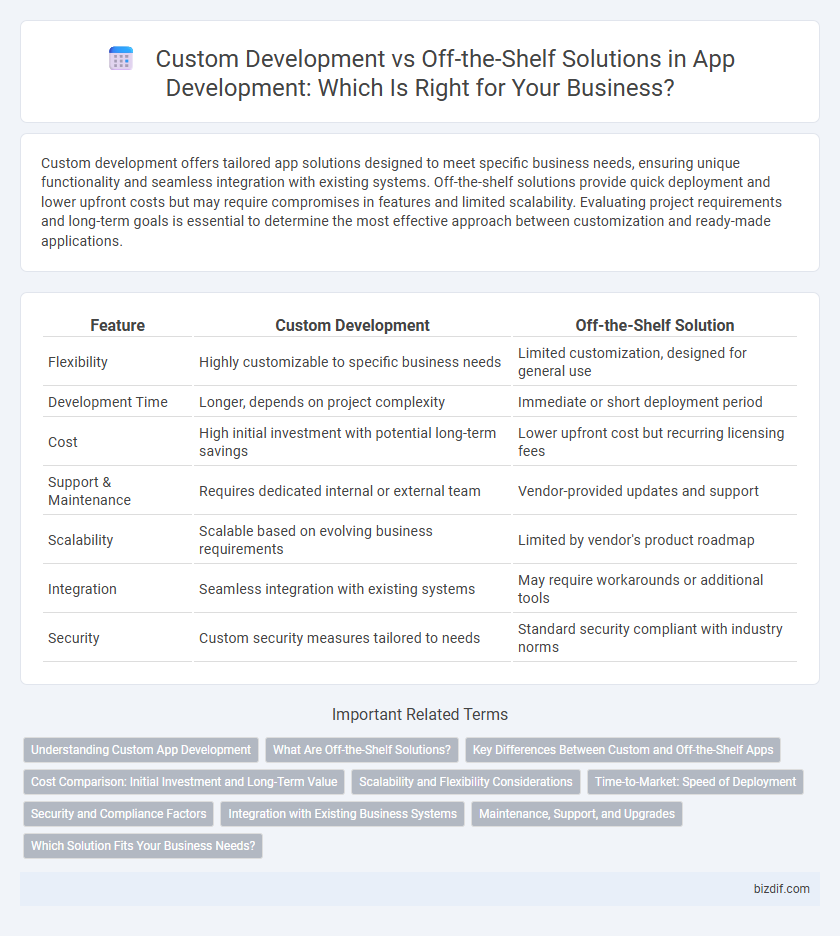Custom development offers tailored app solutions designed to meet specific business needs, ensuring unique functionality and seamless integration with existing systems. Off-the-shelf solutions provide quick deployment and lower upfront costs but may require compromises in features and limited scalability. Evaluating project requirements and long-term goals is essential to determine the most effective approach between customization and ready-made applications.
Table of Comparison
| Feature | Custom Development | Off-the-Shelf Solution |
|---|---|---|
| Flexibility | Highly customizable to specific business needs | Limited customization, designed for general use |
| Development Time | Longer, depends on project complexity | Immediate or short deployment period |
| Cost | High initial investment with potential long-term savings | Lower upfront cost but recurring licensing fees |
| Support & Maintenance | Requires dedicated internal or external team | Vendor-provided updates and support |
| Scalability | Scalable based on evolving business requirements | Limited by vendor's product roadmap |
| Integration | Seamless integration with existing systems | May require workarounds or additional tools |
| Security | Custom security measures tailored to needs | Standard security compliant with industry norms |
Understanding Custom App Development
Custom app development involves creating software tailored specifically to meet the unique requirements and workflows of a business, ensuring seamless integration with existing systems and platforms. This approach allows for scalability, enhanced security, and flexibility in feature implementation, which off-the-shelf solutions often lack due to their generic design. Investing in custom development results in a solution that directly aligns with organizational goals, providing a competitive advantage through optimized user experiences and precise functionality.
What Are Off-the-Shelf Solutions?
Off-the-shelf solutions are pre-built software applications designed to meet common business needs and are available for immediate purchase and deployment. These solutions offer standardized features and regular updates but may lack customization to specific workflows. Popular examples include Microsoft Office, Adobe Creative Cloud, and Salesforce, providing quick value without the development time and expense associated with custom-built apps.
Key Differences Between Custom and Off-the-Shelf Apps
Custom app development offers tailored functionality, scalability, and integration capabilities designed to meet specific business requirements, whereas off-the-shelf solutions provide pre-built features and faster deployment but limited customization. Security, user experience, and long-term cost efficiency significantly differ, with custom apps allowing enhanced control over data protection and unique UX design. Off-the-shelf apps often suit smaller projects or businesses needing immediate solutions, while custom development supports complex workflows and unique competitive advantages.
Cost Comparison: Initial Investment and Long-Term Value
Custom development typically involves a higher initial investment due to tailored design, coding, and testing requirements, but it provides long-term value through scalability and precise functionality. Off-the-shelf solutions offer lower upfront costs with immediate deployment but may incur additional expenses for licensing, customization, and integration over time. Evaluating total cost of ownership, including maintenance and upgrade flexibility, is essential for choosing between these app development approaches.
Scalability and Flexibility Considerations
Custom development offers superior scalability and flexibility by enabling tailored features and architecture that evolve with business needs, unlike off-the-shelf solutions that often impose limitations due to predefined functionalities. As enterprises grow, custom apps facilitate seamless integration with existing systems and allow iterative enhancements, ensuring long-term adaptability. Off-the-shelf software may require costly workarounds or replacements to accommodate expanding user bases or unique processes, limiting operational agility.
Time-to-Market: Speed of Deployment
Custom development allows tailored features but typically requires longer time-to-market due to coding, testing, and iterative refinement. Off-the-shelf solutions offer rapid deployment with pre-built functionalities, significantly reducing the speed of implementation. Businesses prioritizing quick market entry often favor off-the-shelf options to accelerate launch timelines and gain competitive advantage.
Security and Compliance Factors
Custom development offers tailored security features and compliance measures specifically designed to meet industry regulations, reducing vulnerabilities inherent in generic solutions. Off-the-shelf software may include standardized security protocols but often lacks the flexibility to fully comply with unique organizational policies or evolving legal requirements. Choosing between custom and off-the-shelf depends on the criticality of data protection needs and the complexity of regulatory environments your app must navigate.
Integration with Existing Business Systems
Custom development offers seamless integration with existing business systems by tailoring applications to specific workflows, data structures, and APIs, ensuring optimal compatibility and performance. Off-the-shelf solutions often require extensive customization or middleware to connect with legacy systems, potentially leading to data silos and integration challenges. Prioritizing integration capabilities reduces operational disruptions and enhances overall system efficiency.
Maintenance, Support, and Upgrades
Custom development offers tailored maintenance and support services that align precisely with specific business needs, ensuring faster issue resolution and seamless integration of upgrades. Off-the-shelf solutions provide standardized support and routine updates, but may lack flexibility to address unique system requirements or rapid scaling demands. Selecting the right approach depends on balancing the need for personalized, continuous care with cost-effective, vendor-managed maintenance cycles.
Which Solution Fits Your Business Needs?
Custom development offers tailored app solutions that align precisely with unique business processes, ensuring scalability and competitive advantage. Off-the-shelf solutions provide quicker deployment and lower initial costs, suitable for standard functionalities and smaller budgets. Evaluating factors like flexibility, timeline, budget constraints, and specific feature requirements helps determine which approach best fits your business needs.
Custom Development vs Off-the-Shelf Solution Infographic

 bizdif.com
bizdif.com